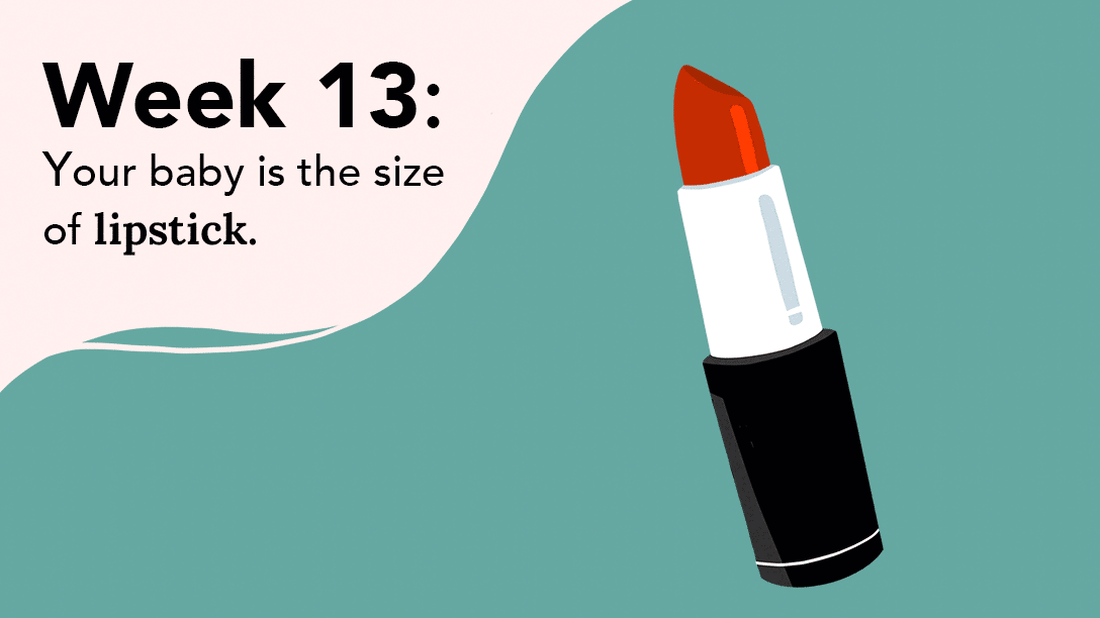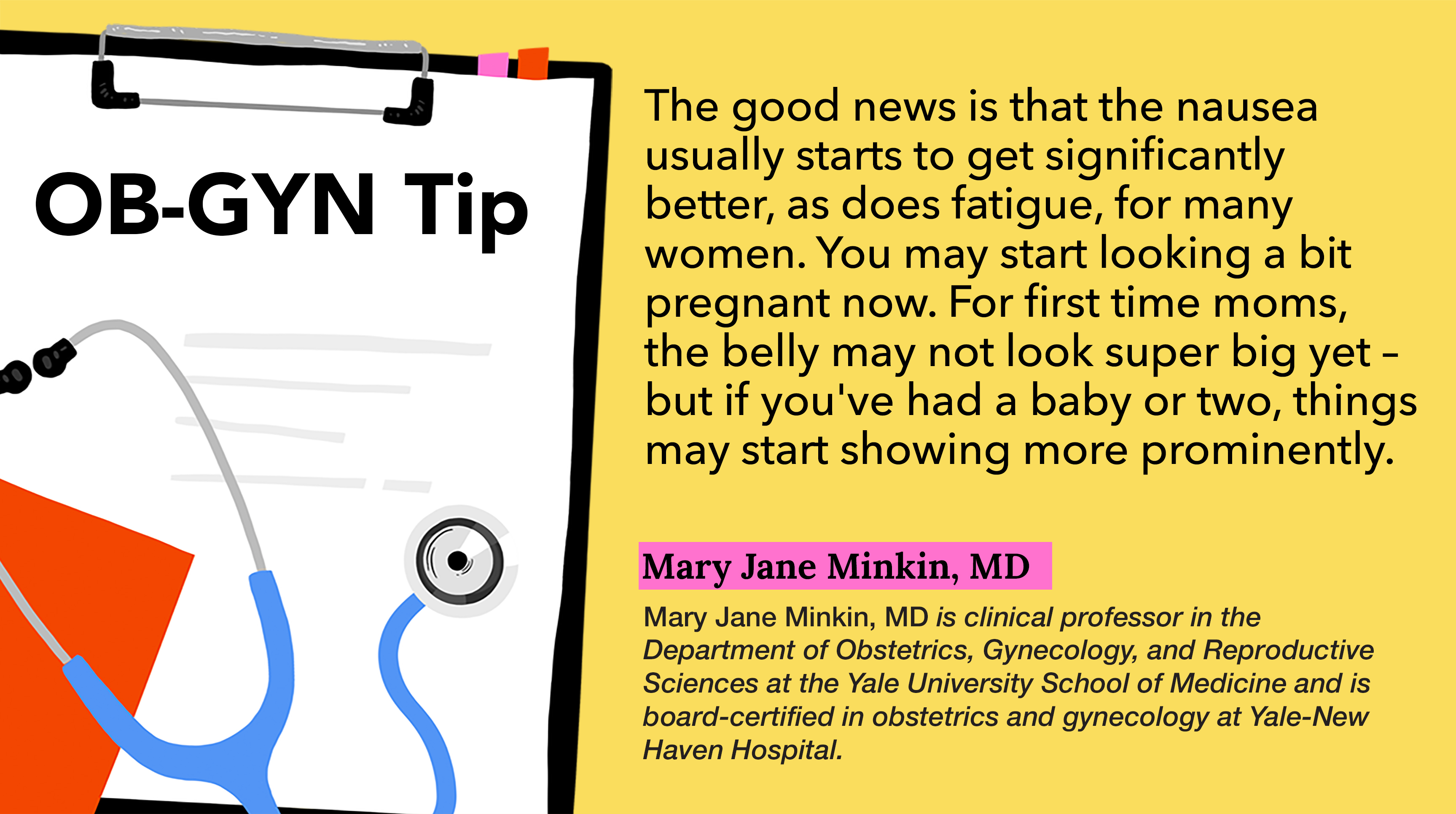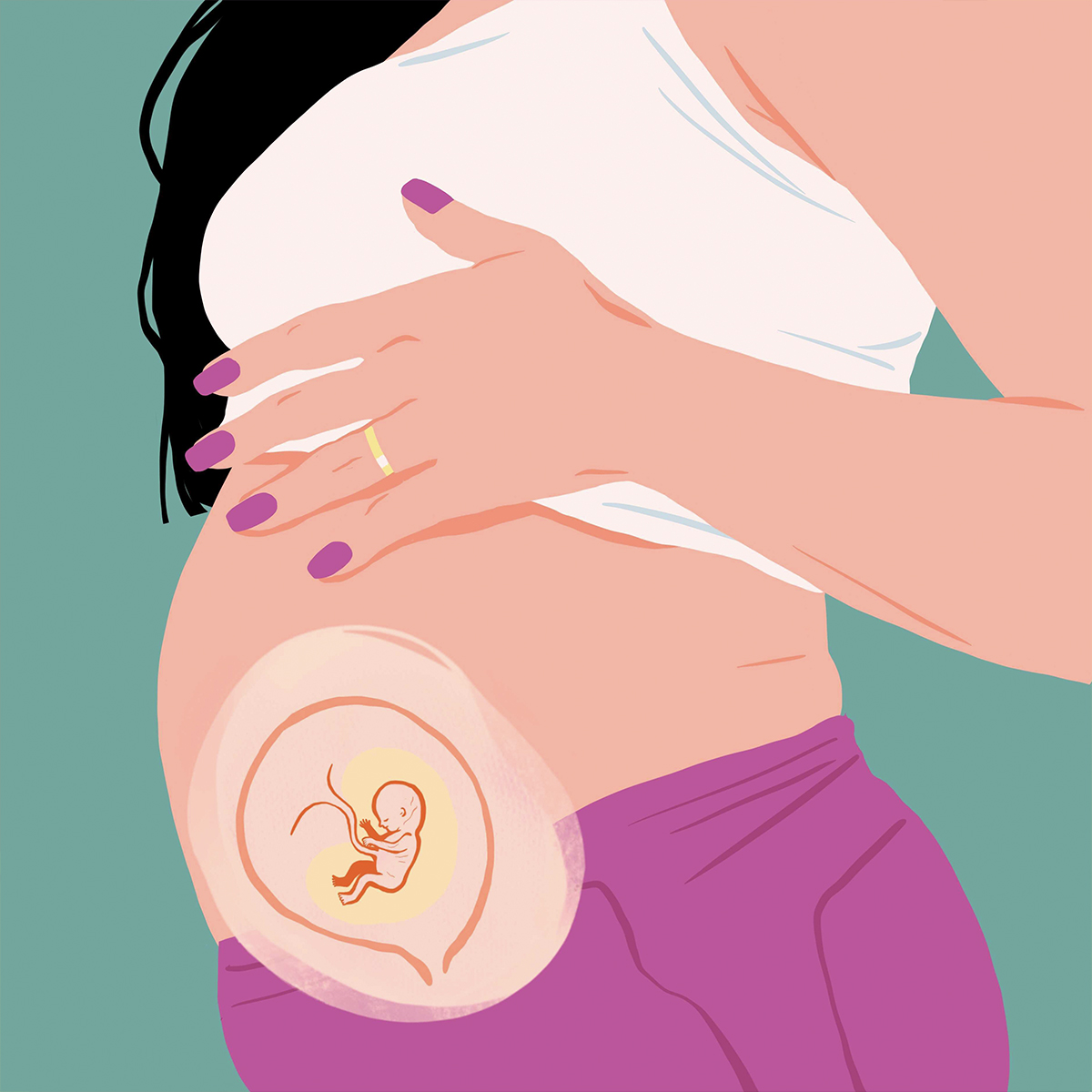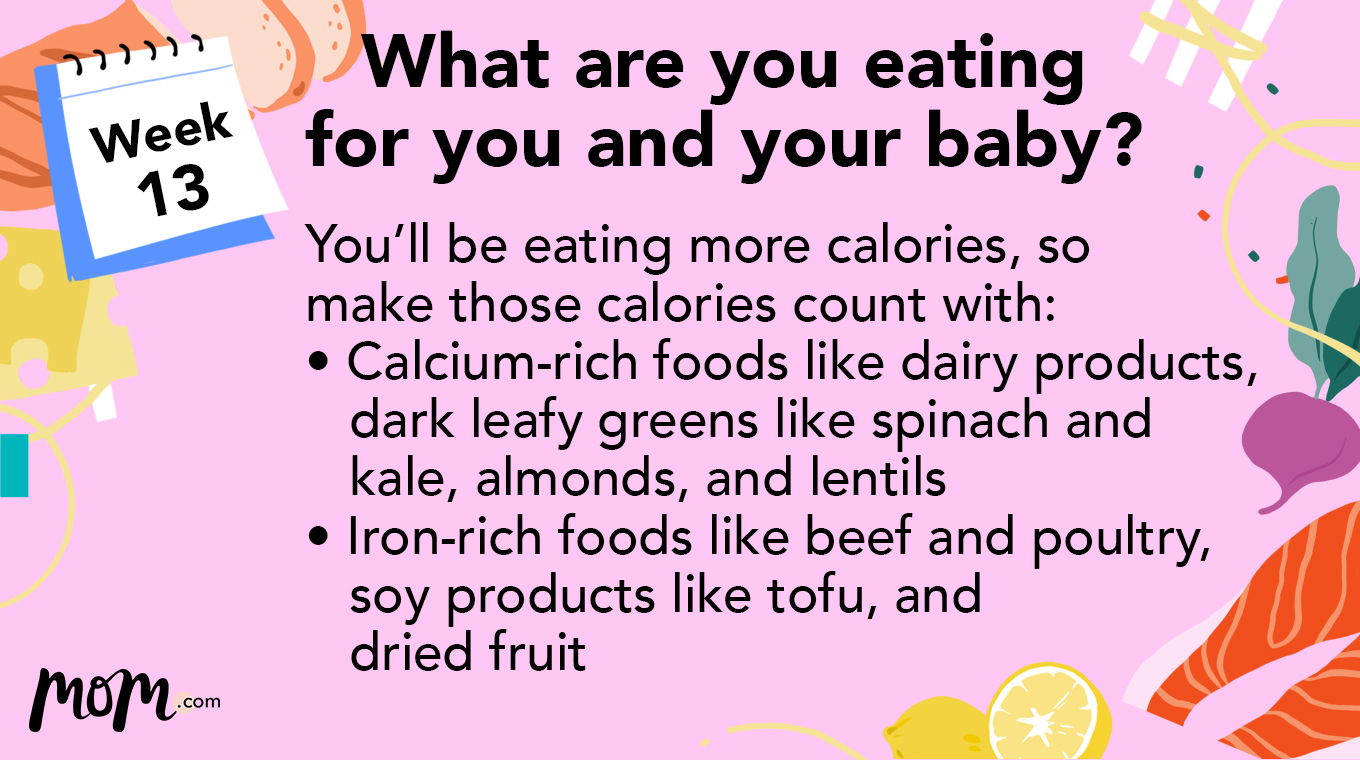
In this article
You’re 13 weeks pregnant!
You’re at the home stretch of the first trimester now. At 13 weeks pregnant, you may or may not be able to feel your baby yet, but know that they’re wiggling around right now, testing those new limbs. You have a well-developed placenta at this point, and your fetus is getting the nutrients and oxygen they need. By 13 weeks, your developing baby may begin putting their thumb into their mouth — they can’t fully suck yet, as those muscles haven’t finished developing, but that won’t stop them from trying.

Pregnancy symptoms at 13 weeks
Now that you’re in the last week of your first trimester, some relief is on the horizon if you have morning sickness and the risk of miscarriage decreases significantly. If your symptoms still haven’t ameliorated, at least the second trimester is generally a golden time where nausea eases, your energy levels get a nice boost, and many women experience a surge in their sex drive.
Here are some additional signs of pregnancy at 13 weeks:
Making colostrum
You may notice your breasts will occasionally leak a thick and sticky liquid that may be yellow or light orange — that’s colostrum, which is the milk-like fluid that comes in right after you give birth. It’s rich in antibodies, carbohydrates, and protein and low in fat (which is difficult for newborns to digest).
Round ligament pain
Due to the fact that you’ll eventually fit an entire human infant in your uterus, a common symptom of pregnancy is mild cramping and round ligament pain as your body expands. Located in your pelvic area, the round ligaments are a pair of ligaments that keep your uterus where it’s supposed to be — and thus as your uterus stretches, you may feel a dull ache or a sharp, piercing pain in your lower abdominal area.
While this kind of pain is expected, if you experience cramping or pain longer than a few minutes at a time — even after resting, please contact your doctor.
Exhaustion
Though extreme fatigue generally dissipates by the second trimester, you may still be feeling tired all the time — which is completely normal. You’re flooded with progesterone and estrogen which are natural sedatives, and your body is changing drastically physically and perhaps emotionally. Of course, you’re tired.
More energy
On the other hand, you may already be feeling that second trimester energy bump! Most pains and complaints, nausea, and fatigue fade during this honeymoon phase of pregnancy and you may feel as if you can conquer the entire world.
Vaginal discharge
Due to the increased production of estrogen, you may notice an increase in vaginal discharge (leukorrhea) which is to protect your vagina from infection and keep a healthy balance of bacteria. The discharge is usually thin, milky in color, no or mild in odor, and will increase during pregnancy.
What does 13 weeks equal in months?
At 13 weeks pregnant, you’re at the end of your first trimester of pregnancy. Since pregnancy is 40 weeks long, it’s not easily divisible by three to split into trimesters and can get confusing real quick. Each trimester is about 13 to 14 weeks long, and at 13 weeks pregnant, you’re in your first trimester. Here’s a quick primer what pregnancy weeks equal to in months in your first trimester:
- Month 3: Weeks 9 to 13
- Month 4: Weeks 14 to 17
- Month 5: Weeks 18 to 22
Your ultrasound
The American College of Obstetricians and Gynecologists (ACOG) recommends pregnant women get at least one ultrasound at 18 to 22 weeks to check on the health and development of the fetus. Some patients also get an ultrasound in their first trimester to estimate gestational age, count the number of fetuses, screen for certain genetic disorders, and check for fetal heartbeat and possible ectopic pregnancy.
Your pregnant belly at 13 weeks

At 13 weeks pregnant, your fetus is about the size of lipstick and their head is about half the size of their body measured from crown-to-rump. Don’t worry though — by the time you give birth, their head will be at the more expected baby size of 3/4 their total size.
Tiny bones are now developing around your baby’s head, arms and legs and they might even have started to be able to move around. Soon, your fetus will be able to suck their thumb! Though their intestines thus far have been growing in the umbilical cord, they are now migrating to their abdomen permanently. The placenta is also increasing in size and in addition, the fetal vocal cords are developing — though you won’t be able to hear them use it. Your baby is also swallowing amniotic fluid and peeing and producing meconium — the sticky, tar like poop they pass in their first poopy diaper.
Pregnancy tips at 13 weeks
Now that the second trimester is around the corner, you may
Take your vitamins
You may be tempted to stop taking your prenatal vitamins and supplements — sometimes, because they can often be huge and difficult to swallow — or cause nausea. You can ask your OB/GYN to prescribe prenatal vitamins or supplements that are easier on the stomach.
Stay healthy
While that sounds really non-specific, pregnant women are more prone to getting sick because during pregnancy, your body suppresses your immune system so that you won’t reject the fetus you’re carrying. Thus, make sure you actively implement non-pharmaceutical interventions like social distancing, mask-wearing, and hand-washing.
Your pregnancy checklist at 13 weeks
By the second trimester, you will be seeing your OB-GYN every four weeks — and those will definitely fill up fast! If you haven’t scheduled these visits yet, make sure you get those appointments on the books. Some other things you may want to put on your 13 week pregnant checklist include:
- Eat enough calories to feed and nourish your growing baby — especially if you’re carrying multiples or have underlying medical conditions. Ask your medical provider for what would be best for your health.
- Stay active to keep up your health — by 13 weeks, you will likely need to avoid abdominal exercises that require you to be on your back such as sit ups.
What are you eating for you and your baby?

Not only should you be eating more calories, you will need to make those calories count. Ensure a healthy diet for yourself at 13 weeks pregnant by filling yourself with high in nutrient foods and additional supplements and vitamins. Consider emphasizing the following foods and nutrients:
Calcium
Continuing eating calcium rich foods such as dairy products, dark leafy greens like spinach and kale, almonds, and lentils. Make sure to pair with foods containing Vitamin D to help your body absorb the calcium. Try foods such as salmon, egg yolks, and herring or sardines.
Iron
Due to increased blood volume in your body, you will need more iron in your diet. You can try slow-release pills which cause less constipation, and iron-rich foods like beef, poultry, soy products like tofu, and dried fruit.
In addition, try to avoid or restrict the following foods:
- Caffeine, alcohol, and drugs
- Undercooked meats
- Unheated lunch meats
- Unpasteurized foods (e.g.: soft cheeses)
- Unwashed fruits and vegetables
- High mercury seafoods
- Raw seafood (e.g.: sushi)
- Raw eggs
When to call your doctor
At 13 weeks pregnant, if you are bleeding, spotting, and experiencing pelvic or abdominal cramping, please contact your medical practitioner immediately. In addition, if you are feeling depression, excessive stress, or anxiety, consider reaching out to a mental health professional for help. According to a review, these mental health issues can be contributing factors to preterm birth, low birth weight, and postpartum depression.
According to the Centers for Disease Control and Prevention (CDC), pregnant women are at a higher risk of severe illness from COVID-19 and death compared to non-pregnant people. Furthermore, pregnant women with COVID-19 are at increased risk of delivering a baby before 37 weeks (preterm birth) and other adverse ramifications.
Note: If you are visiting a medical professional during COVID, make sure to ask about the facility’s safety measures and confirm that they are following COVID protocols as indicated by the CDC.
Additional considerations
Due to racism and other systemic issues such as lack of access to care and the poor quality of that care in the United States, Black, indigenous American, and Alaska Native women are 2 to 3 times more likely to die from pregnancy-related causes than white women — with Black women specifically dying at 3 to 4 times the rate of white women. Furthermore, Black women have the highest infant mortality rate in the U.S., of which a great contributing factor is preterm labor.
Take measures to protect your baby’s health as well as your own such as advocating for yourself or having a partner or friend to advocate on your behalf. Here are some resources you may find helpful:
*Disclaimer: The advice on Mom.com is not a substitute for consultation with a medical professional or treatment for a specific condition. You should not use this information to diagnose or treat a health problem without consulting a qualified professional. Please contact your health-care provider with questions and concerns.


